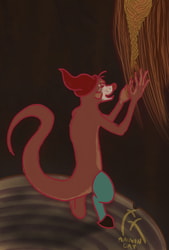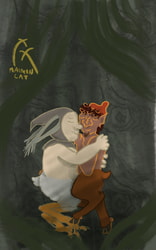Sign In
CloseTorniamo alle origini dei nostri folletti, alla prima trascrizione di una leggenda sparsa in tutta Italia: che rubando il berretto (rosso) al folletto, questo ti mostrerà il suo tesoro.
La versione più antica di questa storia la troviamo nel "Satyricon" di Petronio, in riferimento ad un commensale arricchito velocemente:
7. ... Poco fa, come lavoro, portava la legna sulle spalle.
8.Sidice–nonsoniente,maneho sentito parlare –, che rubò il berretto a Incubo e trovò così un tesoro.
9. Io comunque non invidio chi riceve qualcosa da un dio.
- "Satyricon" 38, 7-9, traduzione di Massimo Gusso
Kehren wir zum Ursprung unserer Kobolde zurück, zu einer Sage die in gans Italien verbreitet ist: dass wenn einer einem Wichtel die (rote) Mütze stiehlt, dieser ihm seinen Schatz zeigen muss.
Die älteste Version von dieser Geschichte findet sich in Petrons Satyricon, über einen der schnell viel Geld gewonnen hat:
7. … vor kurzem trug er noch Holz auf dem Nacken als Arbeit.
8. Man sagt dass er irgendwie- Ich weiß von nichts, hab aber gehört - dass er dem Nachtmahr die Kappe gestohlen hat und einen Schatz fand.
9. Ich beneide jedenfalls nicht den, der ‘was von einem Gott geschenkt bekommt.
“Satyricon" 38, 7-9
Let us return to the origin of our goblins, to a legend that is well-known throughout all of Italy: that if you’re able to steal a goblin’s (red) cap, he will show you his treasure.
The oldest version of this tale can be found in Petronius’s "Satyricon", reguarding a guest who got rich suspiciously fast:
7. … some time ago he carried wood on his back for work.
8. They say that somehow- I know of nothing, but I heard it told - that he stole the cap of an Incubus and found a treasure.
9. I for my part wouldn’t envy someone who got something from a god.
"Satyricon", 38, 7-9
Submission Information
- Views:
- 60
- Comments:
- 0
- Favorites:
- 0
- Rating:
- General
- Category:
- Visual / Digital




